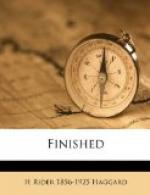Presently I found myself standing by a tall, rather loosely-built man whose face attracted me. It was clean-shaven and much bronzed by the sun, but not in any way good-looking; the features were too irregular and the nose was a trifle too long for good looks. Still the impression it gave was pleasant and the steady blue eyes had that twinkle in them which suggests humour. He might have been thirty or thirty-five years of age, and notwithstanding his rough dress that consisted mainly of a pair of trousers held up by a belt to which hung a pistol, and a common flannel shirt, for he wore no coat, I guessed at once that he was English-born.
For a while neither of us said anything after the taciturn habit of our people even on the veld, and indeed I was fully occupied in listening to the truculent talk of a little party of mounted Boers behind us. I put my pipe into my mouth and began to hunt for my tobacco, taking the opportunity to show the hilt of my revolver, so that these men might see that I was armed. It was not to be found, I had left it in the wagon.
“If you smoke Boer tobacco,” said the stranger, “I can help you,” and I noted that the voice was as pleasant as the face, and knew at once that the owner of it was a gentleman.
“Thank you, Sir. I never smoke anything else,” I answered, whereon he produced from his trousers pocket a pouch made of lion skin of unusually dark colour.
“I never saw a lion as black as this, except once beyond Buluwayo on the borders of Lobengula’s country,” I said by way of making conversation.
“Curious,” answered the stranger, “for that’s where I shot the brute a few months ago. I tried to keep the whole skin but the white ants got at it.”
“Been trading up there?” I asked.
“Nothing so useful,” he said. “Just idling and shooting. Came to this country because it was one of the very few I had never seen, and have only been here a year. I think I have had about enough of it, though. Can you tell me of any boats running from Durban to India? I should like to see those wild sheep in Kashmir.”
I told him that I did not know for certain as I had never taken any interest in India, being an African elephant-hunter and trader, but I thought they did occasionally. Just then Robinson passed by and called to me—
“They’ll be here presently, Quatermain, but Sompseu isn’t coming himself.”
“Does your name happen to be Allan Quatermain?” asked the stranger. “If so I have heard plenty about you up in Lobengula’s country, and of your wonderful shooting.”
“Yes,” I replied, “but as for the shooting, natives always exaggerate.”
“They never exaggerated about mine,” he said with a twinkle in his eye. “Anyhow I am very glad to see you in the flesh, though in the spirit you rather bored me because I heard too much of you. Whenever I made a particularly bad miss, my gun-bearer, who at some time seems to have been yours, would say, ’Ah! if only it had been the Inkosi Macumazahn, how different would have been the end!’ My name is Anscombe, Maurice Anscombe,” he added rather shyly. (Afterwards I discovered from a book of reference that he was a younger son of Lord Mountford, one of the richest peers in England.)




